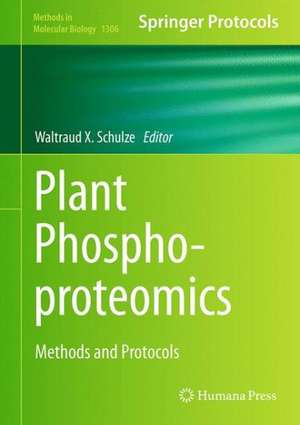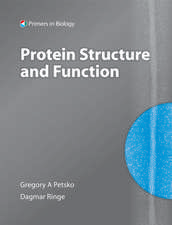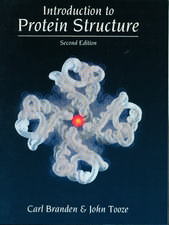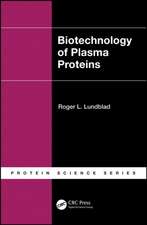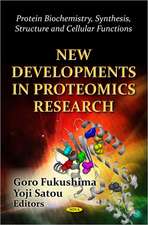Plant Phosphoproteomics: Methods and Protocols: Methods in Molecular Biology, cartea 1306
Editat de Waltraud X. Schulzeen Limba Engleză Hardback – mai 2015
Practical and authoritative, Plant Phosphoproteomics: Methods and Protocols serves as an ideal reference for researchers investigating this vital area of plant science.
| Toate formatele și edițiile | Preț | Express |
|---|---|---|
| Paperback (1) | 527.27 lei 38-44 zile | |
| Springer – 9 oct 2016 | 527.27 lei 38-44 zile | |
| Hardback (1) | 648.42 lei 43-57 zile | |
| Springer – mai 2015 | 648.42 lei 43-57 zile |
Din seria Methods in Molecular Biology
- 9%
 Preț: 791.63 lei
Preț: 791.63 lei - 23%
 Preț: 598.58 lei
Preț: 598.58 lei - 20%
 Preț: 882.98 lei
Preț: 882.98 lei -
 Preț: 252.05 lei
Preț: 252.05 lei - 5%
 Preț: 802.70 lei
Preț: 802.70 lei - 5%
 Preț: 729.61 lei
Preț: 729.61 lei - 5%
 Preț: 731.43 lei
Preț: 731.43 lei - 5%
 Preț: 741.30 lei
Preț: 741.30 lei - 5%
 Preț: 747.16 lei
Preț: 747.16 lei - 15%
 Preț: 663.45 lei
Preț: 663.45 lei - 18%
 Preț: 1025.34 lei
Preț: 1025.34 lei - 5%
 Preț: 734.57 lei
Preț: 734.57 lei - 18%
 Preț: 914.20 lei
Preț: 914.20 lei - 15%
 Preț: 664.61 lei
Preț: 664.61 lei - 15%
 Preț: 654.12 lei
Preț: 654.12 lei - 18%
 Preț: 1414.74 lei
Preț: 1414.74 lei - 5%
 Preț: 742.60 lei
Preț: 742.60 lei - 20%
 Preț: 821.65 lei
Preț: 821.65 lei - 18%
 Preț: 972.30 lei
Preț: 972.30 lei - 15%
 Preț: 660.49 lei
Preț: 660.49 lei - 5%
 Preț: 738.41 lei
Preț: 738.41 lei - 18%
 Preț: 984.92 lei
Preț: 984.92 lei - 5%
 Preț: 733.29 lei
Preț: 733.29 lei -
 Preț: 392.60 lei
Preț: 392.60 lei - 5%
 Preț: 746.26 lei
Preț: 746.26 lei - 18%
 Preț: 962.66 lei
Preț: 962.66 lei - 23%
 Preț: 860.22 lei
Preț: 860.22 lei - 15%
 Preț: 652.64 lei
Preț: 652.64 lei - 5%
 Preț: 1055.50 lei
Preț: 1055.50 lei - 23%
 Preț: 883.87 lei
Preț: 883.87 lei - 19%
 Preț: 491.89 lei
Preț: 491.89 lei - 5%
 Preț: 1038.86 lei
Preț: 1038.86 lei - 5%
 Preț: 524.16 lei
Preț: 524.16 lei - 18%
 Preț: 2122.34 lei
Preț: 2122.34 lei - 5%
 Preț: 1299.23 lei
Preț: 1299.23 lei - 5%
 Preț: 1339.12 lei
Preț: 1339.12 lei - 18%
 Preț: 1390.26 lei
Preț: 1390.26 lei - 18%
 Preț: 1395.63 lei
Preț: 1395.63 lei - 18%
 Preț: 1129.65 lei
Preț: 1129.65 lei - 18%
 Preț: 1408.26 lei
Preț: 1408.26 lei - 18%
 Preț: 1124.92 lei
Preț: 1124.92 lei - 18%
 Preț: 966.27 lei
Preț: 966.27 lei - 5%
 Preț: 1299.99 lei
Preț: 1299.99 lei - 5%
 Preț: 1108.51 lei
Preț: 1108.51 lei - 5%
 Preț: 983.76 lei
Preț: 983.76 lei - 5%
 Preț: 728.16 lei
Preț: 728.16 lei - 18%
 Preț: 1118.62 lei
Preț: 1118.62 lei - 18%
 Preț: 955.25 lei
Preț: 955.25 lei - 5%
 Preț: 1035.62 lei
Preț: 1035.62 lei - 18%
 Preț: 1400.35 lei
Preț: 1400.35 lei
Preț: 648.42 lei
Preț vechi: 762.85 lei
-15% Nou
Puncte Express: 973
Preț estimativ în valută:
124.09€ • 129.07$ • 102.44£
124.09€ • 129.07$ • 102.44£
Carte tipărită la comandă
Livrare economică 14-28 aprilie
Preluare comenzi: 021 569.72.76
Specificații
ISBN-13: 9781493926473
ISBN-10: 1493926470
Pagini: 240
Ilustrații: X, 231 p. 24 illus., 16 illus. in color.
Dimensiuni: 178 x 254 x 18 mm
Greutate: 0.64 kg
Ediția:2015
Editura: Springer
Colecția Humana
Seria Methods in Molecular Biology
Locul publicării:New York, NY, United States
ISBN-10: 1493926470
Pagini: 240
Ilustrații: X, 231 p. 24 illus., 16 illus. in color.
Dimensiuni: 178 x 254 x 18 mm
Greutate: 0.64 kg
Ediția:2015
Editura: Springer
Colecția Humana
Seria Methods in Molecular Biology
Locul publicării:New York, NY, United States
Public țintă
Professional/practitionerCuprins
The Plant Kinome.- Phosphatases in Plants.- Phosphoproteomics in Cereals.- Screening of Kinase Substrates Using Kinase-Knockout Mutants.- Phosphopeptide Profiling of Receptor Kinase Mutants.- Combining Metabolic 15N Labelling with Improved TandemMOAC for Enhanced Probing of the Phosphoproteome.- Kinase Activity and Specificity Assay Using Synthetic Peptides.- Absolute Quantitation of Protein Post-Translational Modification Isoform.- Phosphorylation Stoichiometry Determination in Plant Photosynthetic Membranes.- Phosphopeptide Immuno-Affinity Enrichment to Enhance Detection of Tyrosine Phosphorylation in Plants.- The Peptide Microarray ChloroPhos1.0: A Screening Tool for the Identification of Arabidopsis thaliana Chloroplast Protein Kinase Substrates.- Plant Protein Kinase Substrates Identification Using Protein Microarrays.- Targeted Analysis of Protein Phosphorylation by 2D Electrophoresis.- Computational Phosphorylation Network Reconstruction: Methods and Resources.- Computational Identification of Protein Kinases and Kinase-Specific Substrates in Plants.- Databases for Plant Phosphoproteomics.- Phosphorylation Site Prediction in Plants.
Textul de pe ultima copertă
This detailed volume addresses recent developments in phosphoproteomic techniques with a particular focus on the plant system. Over the recent decades, proteomic methods were refined to study the significance and dynamics of protein phosphorylation in various biological contexts. However, working with plant tissue imposes particular challenges to the biologist which are attributed to the rigid cell wall making protein extraction more difficult, the skewed protein abundance with Rubisco as a highly abundant protein, and a large central vacuole leading to low protein yield and increased degradative enzyme activity. The methodologies in this book seek to move beyond these issues. Written for the Methods in Molecular Biology series, chapters include introductions to their respective topics, lists of the necessary materials and reagents, step-by-step, readily reproducible laboratory protocols, and tips on troubleshooting and avoiding known pitfalls.
Practical and authoritative, Plant Phosphoproteomics: Methods and Protocols serves as an ideal reference for researchers investigating this vital area of plant science.
Practical and authoritative, Plant Phosphoproteomics: Methods and Protocols serves as an ideal reference for researchers investigating this vital area of plant science.
Caracteristici
Includes cutting-edge methods and protocols in plant phosphoproteomics Provides step-by-step detail essential for reproducible results Contains key notes and implementation advice from the experts
